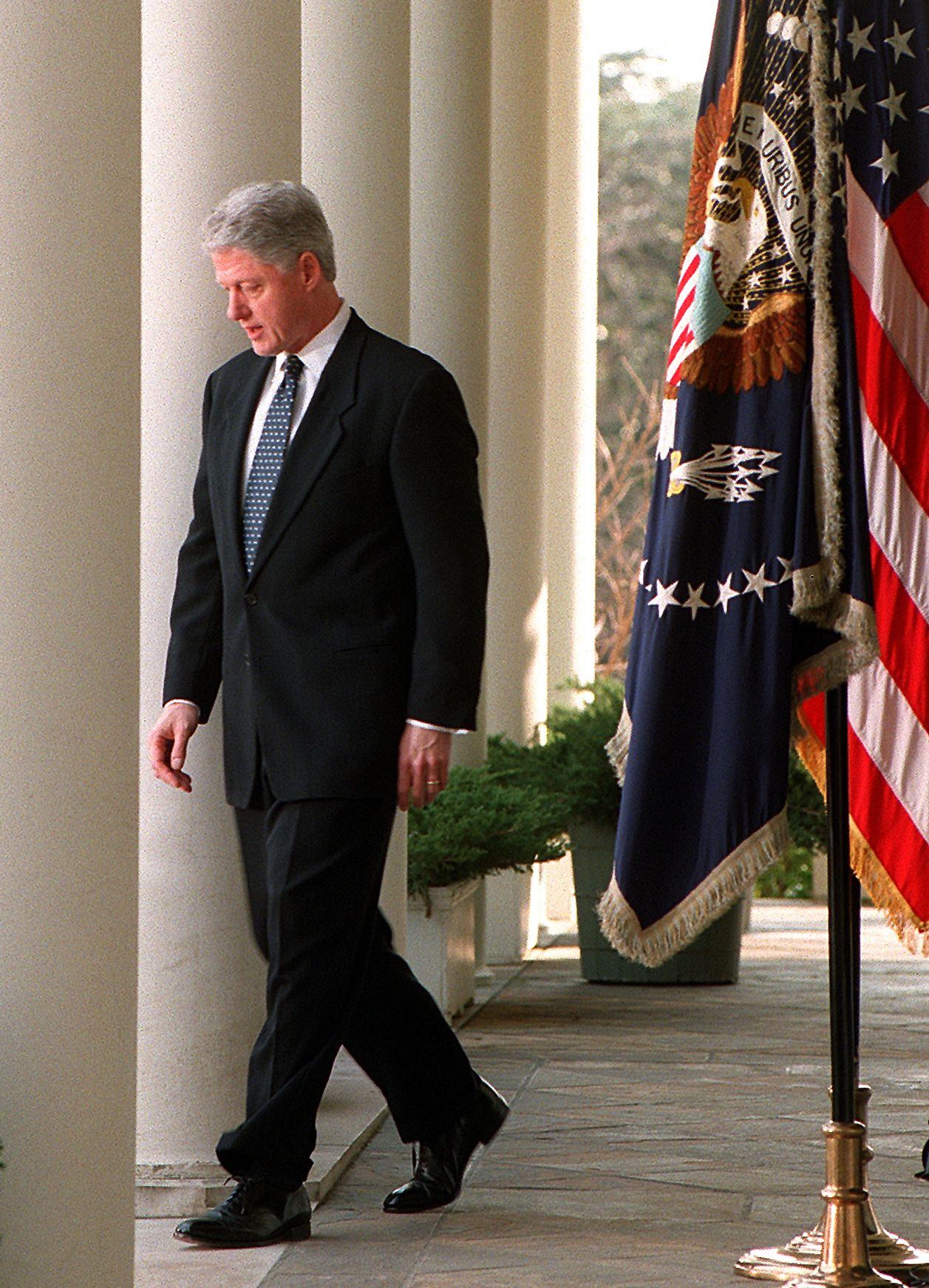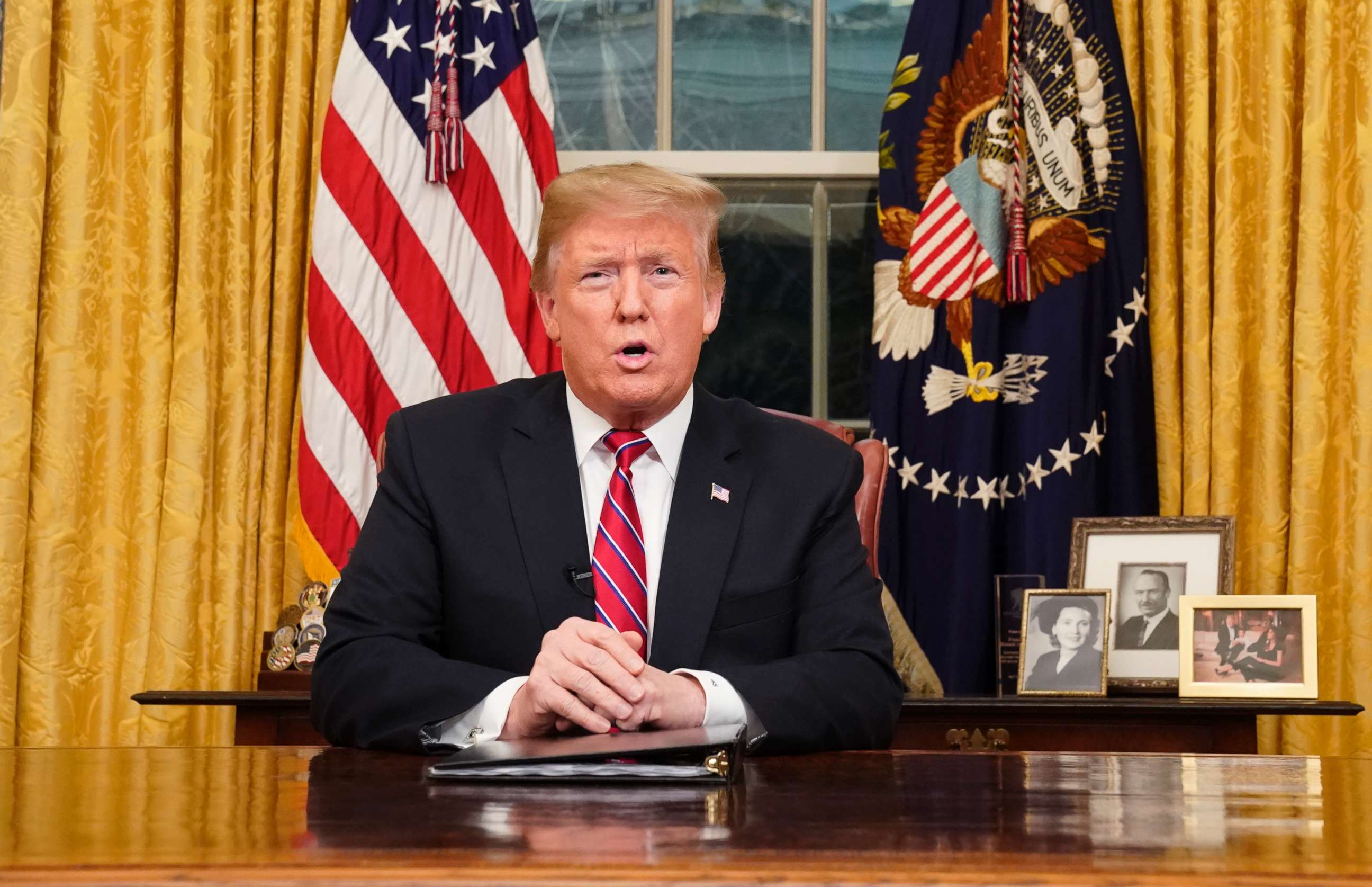
Here's a list of the presidents who declared still ongoing national emergencies.
January 10, 2019, 6:58 PMPresident Donald Trump speaks from the Oval Office of the White House as he gives a prime-time address about border security, Jan. 8, 2018, in Washington.
Carlos Barria/APAccording to the Federal Register, 58 national emergencies have been declared since the National Emergency Act of 1976 was signed into law by President Gerald Ford.
And 31 have been annually renewed and are currently still in effect, as listed in the Federal Register.
Here's a list of the presidents who declared still ongoing national emergencies.
Nov 14, 1979: The National Emergency With Respect to Iran, in response to the Iran hostage crisis.

Nov 14, 1994: The National Emergency With Respect to the Proliferation of Weapons of Mass Destruction, that combined two previous national emergencies focused on weapons of mass destruction.
Jan. 2, 1995: The National Emergency With Respect to Prohibiting Transactions with Terrorists Who Threaten to Disrupt the Middle East Peace Process placed economic sanctions in response to the Jerusalem bombing.
March 15, 1995: The National Emergency With Respect to Prohibiting Certain Transactions with Respect to the Development of Iranian Petroleum Resources was an effort to prevent potential deals between oil companies.
October 21, 1995: The National Emergency With Respect to Blocking Assets and Prohibiting Transactions with Significant Narcotics Traffickers Centered in Colombia was declared after increased reports of drug cartels laundering money through American companies.
March 1, 1996: The National Emergency With Respect to Regulations of the Anchorage and Movement of Vessels with Respect to Cuba was after civilian planes were shot down near Cuba
November 3, 1997: The National Emergency With Respect to Blocking Sudanese Government Property and Prohibiting Transactions with Sudan implemented economic and trade sanctions.
June 26, 2001: The National Emergency With Respect to Blocking Property of Persons Who Threaten International Stabilization Efforts in the Western Balkans imposed sanctions on those aiding Albanian insurgents in Macedonia
Aug 17, 2001: The National Emergency With Respect to Export Control Regulations renewed presidential power to control exports in a national emergency since the Export Administration Act of 1979 lapsed.
Sept 14, 2001: The National Emergency with Respect to Certain Terrorist Attacks was in response to the terrorist attacks of 9/11 and the continuing and immediate threat of further attacks on the United States.
Sept 23, 2001: The National Emergency With Respect to Persons who Commit, Threaten to Commit, or Support Terrorism was in response to the terrorist attacks of 9/11.
March 6, 2003: The National Emergency With Respect to Blocking Property of Persons Undermining Democratic Processes or Institutions in Zimbabwe was an effort to punish associates of Robert Mugabe.
May 22, 2003: The National Emergency With Respect to Protecting the Development Fund for Iraq and Certain Other Property in Which Iraq has an Interest was issued following the U.S. invasion of Iraq.
May 11, 2004: The National Emergency With Respect to Blocking Property of Certain Persons and Prohibiting the Export of Certain Goods to Syria was in response to Syria supporting terrorist activity in Iraq.
June 16, 2006: The National Emergency With Respect to Blocking Property of Certain Persons Undermining Democratic Processes or Institutions in Belarus was in response to charges of fraud in the Belarus presidential election.
Oct 27, 2006: The National Emergency With Respect to Blocking Property of Certain Persons Contributing to the Conflict in the Democratic Republic of the Congo was in response to violence around the Congolese presidential election runoff.
Aug 1, 2007: The National Emergency With Respect to Blocking Property of Persons Undermining the Sovereignty of Lebanon was in response to a breakdown of the rule of law in Lebanon.
June 26, 2008: The National Emergency With Respect to Continuing Certain Restrictions with Respect to North Korea cited the risk of proliferation of weapons-usable fissile material. President Trump renewed this June 22, 2018 citing the “existence and risk of proliferation of weapons-usable fissile material on the Korean Peninsula and the actions and policies of the Government of North Korea continue to pose an unusual and extraordinary threat.”
April 12, 2010: The National Emergency With Respect to Blocking Property of Certain Persons Contributing to the Conflict in Somalia was in respect to threats posed by Somali pirates.
February 25, 2011: The National Emergency With Respect to Blocking Property and Prohibiting Certain Transactions Related to Libya froze the assets of Libyan leader Muammar Gaddafi.
July 25, 2011: The National Emergency With Respect to Blocking Property of Transnational Criminals was in response to the rise in crime by specific organizations: Los Zetas (Mexico), The Brothers’ Circle (former Soviet Union countries), the Yakuza (Japan), and the Camorra (Italy).
May 16, 2012: The National Emergency With Respect to Blocking Property of Persons Threatening the Peace, Security, or Stability of Yemen addressed political unrest within the Yemen government.
March 16, 2014: The National Emergency With Respect to Blocking Property of Certain Persons Contributing to the Situation in Ukraine was in response to the Russian invasion of Crimea.
April 3, 2014: The National Emergency With Respect to Blocking Property of Certain Persons With Respect to South Sudan was in response to the ongoing civil war.
May 12, 2014: The National Emergency With Respect to Blocking Property of Certain Persons Contributing to the Conflict in the Central African Republic was in response to violence towards humanitarian aid workers.
March 8, 2015: The National Emergency With Respect to Blocking Property and Suspending Entry of Certain Persons Contributing to the Situation in Venezuela was in response to human rights violations.
April 1, 2015: The National Emergency With Respect to Blocking the Property of Certain Persons Engaging in Significant Malicious Cyber-Enabled Activities was in response to Chinese cyber attacks on the U.S.
Nov 23, 2015: The National Emergency With Respect to Blocking Property of Certain Persons Contributing to the Situation in Burundi was declared after a failed coup.

Dec 20, 2017: The National Emergency With Respect to Blocking the Property of Persons Involved in Serious Human Rights Abuse or Corruption imposed sanctions on the Myanmar general for his role persecuting Rohingya Muslims.
Sept 12, 2018: The National Emergency With Respect to Imposing Certain Sanctions in the Event of Foreign Interference in a United States Election attempted to prevent any meddling with the 2018 midterm elections amid the ongoing investigation into Russian interference in the 2016 presidential election.
Nov 27, 2018: The National Emergency With Respect to Blocking Property of Certain Persons Contributing to the Situation in Nicaragua was declared by President Trump in response to violence and the Ortega regime’s “systematic dismantling and undermining of democratic institutions and the rule of law” that constitutes an “unusual and extraordinary threat to the national security and foreign policy of the United States.”